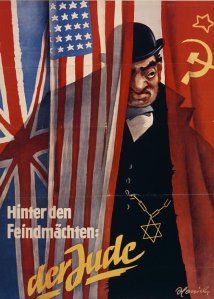Should we be worried about who owns the media? Media ownership is something we think very little about, considering the time we spend absorbing media.

- Nazi propaganda – ‘Behind the Enemy Powers: the Jew’
When we look back at the past, it seems like we should be worried. The WW2 Nazi Party ‘took control of all forms of communication in Germany’ (United States Holocaust Memorial Museum, 2016) censoring any alternative ideologies and saturating the media with their own. Clearly, if a whole nation can be convinced to accept and even support the atrocities of the Nazi Party, then media control must be something we should be more worried about.
The problem, it would seem, is not about who owns the media, but how much of the media they own. In the marketplace for information, there needs to be space for different and sometimes competing ideologies to gain exposure. If someone has an extremist view, but only has the exposure of one radio station for example, this is not so much of a massive problem, as there are other radio stations and types of media to compete with these views. The problem arises when you go to change the TV channel and you see the same thing playing on every channel. Unfortunately for us, it seems this is the way we are heading.
Australia, like most of the world, has a very concentrated pattern of media ownership – our media is controlled primarily by a few key stakeholders, and the trend we are moving along suggests that this exclusive club will only get smaller.
The main players at the moment are –
(Images obtained from Sydney Morning Herald)
Have an explore through their connections here
Unlike the German Nazis, the worry is not of the media being used by the governing party as an ‘ideological state tool’, but as a way for the media moguls further their own interests, supporting political parties with their media influence, in exchange for ‘favours’ and further influence. For example, Murdoch-backed NewsCorp backed the Liberal Party, heavily contributing towards their victory at the 2013 federal elections. This led to interference with the National Broadband Network project, conveniently protecting Murdoch’s investment in Foxtel, whose main competitor happens to be streaming internet based services like Netflix.
The media is a powerful force, that can shape the way society evolves and changes. Because it is so influential, we should be paying more attention to who is running it, so we can apply negotiated readings to ensure exposure to different ideologies in a world where our pool is dwindling.
Bibliography
ACMA, ‘Media Interests Snapshot’ http://www.acma.gov.au/theACMA/media-interests-snapshot (accessed 27/03/2016)
The Sydney Morning Herald, http://www.smh.com.au/ (accessed 28/03/2016)
United States Holocaust Memorial Museum, ‘Nazi Propaganda and Censorship’, https://www.ushmm.org/outreach/en/article.php?ModuleId=10007677 (accessed 27/03/2016)






Hey this is an excellent blog post!
I like how you discussed the Nazi Party and their complete control over all platforms of germany’s media during the lead up to WW2. I also enjoyed that you shifted between history and present. The comparison is just as the same but somewhat less extreme. I believe the the most powerful people are manipulators to the public!
I enjoyed reading your own thoughts and opinions also, it was very relatable to the topic and you were able to level it with your argument.
Overall, great post and I’m looking forward to reading more!
If you want, head over to my blog and check out what I had to say about this weeks topic 🙂
– Lachy
LikeLiked by 1 person
Great blog post!
It seems that the people that run most of our media markets have big arguments on political views, however, in comparison to Germany WWII and their control, they seem to have less of an impact as to how audiences take the information. Most people ignore these types of persuasions and the mass media on the internet now gives people the chance to take independent views.
However, there were some pretty good arguments in here, good work and keep it up 🙂
LikeLike
A great blog post! Drawing comparisons between the Nazi party propaganda and media ownership in Australia was a good way to demonstrate the kind issues that can arise should personal agendas start to be pushed on media audiences. My only two criticisms would be that you didn’t really discuss the internets influence in making media ownership irrelevent and also you made some pretty major claims about Newscorps role in the liberal party becoming elected without substantiating it with a quote or something like that. Overall great but!
LikeLike